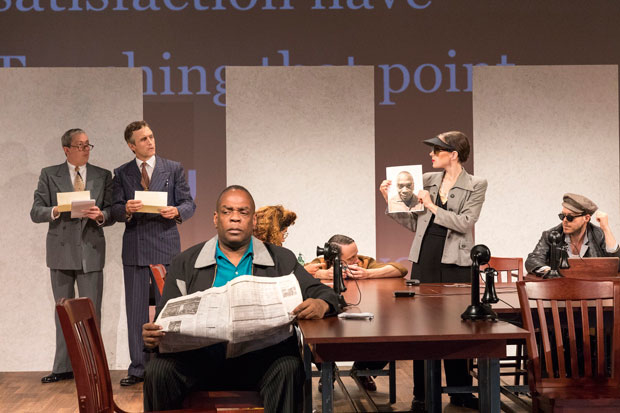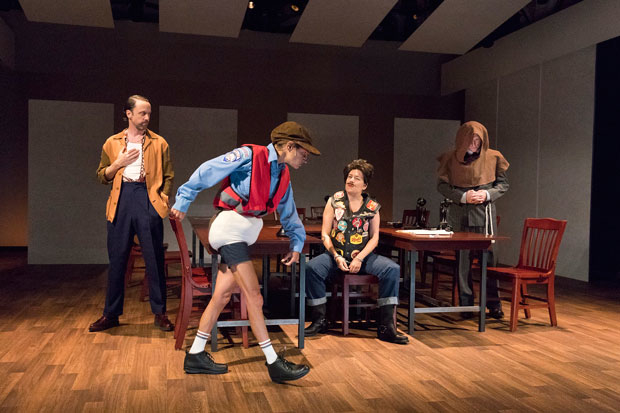Measure for Measure

(© Richard Termine)
There's much to recommend Measure for Measure as a play for our times. With its emphasis on the moral hypocrisy and sexual malefactions of men in the halls of power, Shakespeare's dark comedy feels like something taken from the day's headlines and given a tweak or two. But there's somewhat less to recommend Elevator Repair Service's new production, now running at the Public Theater. John Collins directs the play at a frenetic pace, his actors delivering lines quickly enough to cram most of the text into an intermission-free two hours and 15 minutes. Though this does make for some high-octane performances, the play's language is sometimes rendered incomprehensible by the rapid-fire delivery and Gavin Price's heavy-handed sound design.
Collins sets the play in the early 20th century, judging from the pin-striped suits of the royal characters (costumes by Kaye Voyce) and the numerous black candlestick telephones on tables that suggest a 1920s newsroom (set design by Jim Findlay and props by Amanda Villalobos). The Duke (Scott Shepherd) has decided to take a break from this busy environment and walk incognito among his subjects while he's disguised as a friar. In his place he appoints the self-righteous Angelo (Pete Simpson), a pitiless, merciless tyrant.
That's bad timing for an unfortunate man named Claudio (Greig Sargeant), who has violated a city ordinance that prohibits premarital sex. Angelo, a severe enforcer of the rules, sentences him to death for his crime. Claudio's sister, the novice nun Isabella (Rinne Groff), pleads with Angelo to spare her brother's life, and he agrees to do so, but only if she will submit to a night of carnality with him. Unwilling to sacrifice her virginity, Isabella seems to have guaranteed Claudio's execution — until the Duke, who overheard Angelo's blackmail attempt, hatches a plan to catch his surrogate and reveal his duplicity.

(© Richard Termine)
Those who aren't familiar with the play may find following the plot, delivered at breakneck speed in the first half, a difficult task. Comprehension is aided now and then by Eva von Schweinitz's projections, which include actual passages of text scrolling up the walls of the set. Not until the pivotal scene where Claudio considers sacrificing his sister's chastity in order to save his own hide does the pace slow down, and when it does, it is glacial. Sargeant and Groff are exceptional here, speaking to each other on telephones, as though they are in a prison visiting room, with subdued voices that give way to a rising intensity. But this pace too proves unsustainable and draws out a scene that would pack a more emotional punch if it were a few minutes shorter.
The action soon picks up again, with Collins adding sketch-show elements to the ensuing shenanigans that recall episodes of Laugh-In. Actors' heads pop out sideways, one above the other, from behind one of the back panels, and Lucio (a very funny Mike Iveson) receives slaps to the face with loud, whip-crack sound effects. Tomfoolery like this gets some hearty laughs.
Susie Sokol, with her delightful knack for physical comedy, is especially good as the buffoonish constable Elbow, who prances back and forth with a gangly swagger. The humor is tempered somewhat by the decapitation of a mannequin onstage. It's more forced than funny, and the uncomfortable blend of comedy and tragedy makes it clear why Measure for Measure is often considered one of Shakespeare's "problem plays."
The problems evident in this production do diminish in the final act, when the pace strikes a balance between the extremes. By the end, however, we feel like we've run a theatrical marathon as we race to the restroom. While Elevator Repair Service deserves kudos for pushing the play to its limits, we wish it were a little more measured in pushing us to ours.










